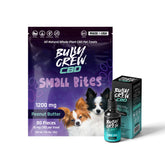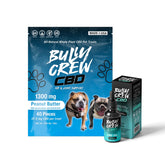Does your dog panic at the sound of fireworks? You're not alone. Fireworks can be one of the sounds that scare dogs—studies show that nearly 50% of dogs are affected. The loud noises and sudden flashes can feel unpredictable and overwhelming, leaving your furry friend stressed and uneasy.
But why do dogs react this way, and more importantly, how can you help them stay calm? Understanding what triggers their fear and the sound that makes dogs go crazy is the first step to making them feel safe during noisy celebrations.

In this blog, we'll explore the causes of dogs' firework anxiety and share simple, practical tips for helping them feel more at ease.
Why are dogs scared of fireworks?
Loud noises like fireworks can be extremely unsettling for dogs, often causing panic or fear. While some dogs may be naturally more sensitive to sound due to genetic factors, life experiences can significantly shape their reactions. Negative encounters or past trauma linked to loud noises can heighten their anxiety, making events like fireworks especially stressful.
Understanding what's behind your dog's fear and the sounds dogs hate is key to helping them feel more secure. Below, we'll explore some of the common causes behind firework anxiety, so you can better understand what might be triggering your dog's reactions and how to address them effectively.
Genetic markup
Some dogs are naturally more sensitive to loud noises like fireworks, and certain breeds are more prone to noise aversion. For instance, a study of over 5,000 dogs revealed that breeds like Shiba Inu and Border Collie exhibit significantly higher levels of fear toward fireworks than larger breeds such as Great Danes and Boxers.
This research also highlighted specific factors that influence noise sensitivity across all breeds. Female dogs were found to be 1.3 times more likely to display fear, while neutered dogs were 1.7 times more likely to be noise-averse. Additionally, age played a significant role—the odds of a dog developing noise-related fear increased by 3.4% each year.
Understanding these patterns can help pet owners better address their scared animal's unique needs. Whether it's a matter of age, breed, or past experiences, being aware of these tendencies can guide you in providing the right support and comfort during stressful events like fireworks.
Read this also: What Are Dogs Afraid Of?
Age-related changes in sensory perception
Noise sensitivity in dogs can emerge at any stage of their lives, with certain periods being more likely than others. Here's a breakdown of the key stages when your dog might develop aversions to loud sounds:
- Socialization Stage (3–12 weeks old): This is a critical learning phase when noise for puppies form lasting impressions. Positive or negative associations with unfamiliar sights, sounds, and environments are made during this time.
- Fear Sensitivity Period (8–10 weeks old): Not all dogs experience this, but those that do may show heightened sensitivity during this phase. It often coincides with being weaned and adjusting to a new home.
- Juvenile Period (6–14 months old): As the socialization window begins to close, puppies may temporarily develop fears of unfamiliar situations or noises that last for weeks or months.
- Adolescence (5–36 months old): While maturing, dogs can still develop noise aversions, though these may diminish with proper training and exposure.
- Adulthood (2–7 years old): By social maturity, dogs are less likely to develop new noise sensitivities, but it's not impossible. Conditions like undetected ear infections could still trigger reactions.
- Senior Years (7+ years old): Cognitive decline in older dogs can alter how they perceive their surroundings, including their reaction to loud noises, making them more susceptible to anxiety.
Lack of socialization
A recent study found that over half of dogs show some fear or anxiety when it comes to fireworks. Interestingly, most of these dogs develop this fear during their first year. Why does this happen? One common reason is a lack of socialization during puppyhood. When puppies aren't exposed to various sights, sounds, and experiences at a young age, they may grow up feeling anxious or fearful when encountering something new or unfamiliar, like fireworks.
Additionally, traumatic experiences, such as exposure to loud or unexpected noise for puppies can trigger lasting fear. Dogs can also learn fear through social transmission—if a dog observes another dog reacting anxiously to a sound, it may adopt the same behavior. Understanding these factors can help pet owners take proactive steps to address and reduce their dog's fireworks anxiety.
Evolution
Bright flashes and booming, unpredictable sounds are more than just startling for your dog—they can trigger a deep sense of anxiety, known as "noise phobia." This reaction isn't just random; it's rooted in canine evolution. Over thousands of years, dogs and other animals developed a survival instinct to react strongly to sudden, unknown threats. They increased their chances of survival in the wild by avoiding anything that seemed dangerous, even if it wasn't an actual threat (like fireworks sounds that scare dogs).
While fireworks might seem harmless to us, they can be a serious danger to your dog. Their heightened senses pick up on the chaotic noise and light, making it hard for them to ignore. Understanding this natural instinct can help you empathize with your pet's fear and take steps to create a safer, more comforting environment during fireworks displays.
Signs your dog has firework anxiety
Fear is a natural and often helpful response that allows dogs to react to potential dangers. However, when fear becomes excessive and overwhelming, it can develop into a phobia—an intense anxiety response that triggers extreme and often uncontrollable behaviors. The severity of noise phobias, such as a fear of fireworks or thunderstorms, can vary. One way to determine if your dog's reaction is normal or problematic is by observing how long it takes for them to recover after the noise stops. Dogs with healthy coping mechanisms typically calm down quickly, while those with maladaptive behaviors may remain anxious or panicked for an extended period.

Left untreated, noise phobias can worsen over time. What starts as noise dogs hate can gradually expand to include other loud or sudden noises, making everyday life increasingly stressful for your dog. Early intervention is key to preventing these fears from escalating and helping your dog feel safe and secure in their environment.
Related: Is CBD Safe for Dogs? An In-Depth Look
Signs of Noise Phobia in Dogs:
- Excessive barking
- Trembling or licking
- Rapid heart rate
- Drooling
- Panting
- Pacing
- Shaking
- Clinginess
- Hiding or cowering
How to help a dog scared of fireworks
1. Calming Firework Fears with CBD Treats
If your dog fears fireworks, treats can be a simple yet powerful way to ease their anxiety. Treats not only serve as a distraction from the loud noises but can also help shift your dog's mood to a calmer, less anxious state.
Our CBD Pet Treats are a wholesome solution packed with 30mg of whole-plant, full-spectrum CBD in every bite. These tasty snacks are made with human-grade ingredients and ensure you're giving your pet only the best. They're perfect for daily use and can be comforting during stressful moments like fireworks displays.
This technique, called counterconditioning, works by changing your dog's emotional response to sounds that make dogs go crazy. Over time, the goal is to replace their fear with a positive association. While this method works best when introduced during puppyhood, it can still make a big difference for dogs of all ages.
2. Reduce the Noise
Reduce the loud sounds dogs hate during fireworks to help your pet feel calmer. Close the windows, turn up the TV, or play music to drown out the noise. You can also use an air conditioner, fan, hairdryer, or white noise machine—just make sure your pet is comfortable with these sounds. For extra protection, consider noise-blocking ear muffs designed for dogs. These small steps can make a big difference in keeping your furry friend relaxed.
3. Comfort Your Dog
When your dog is scared, your support can make a big difference. Don't ignore their fear—be there to comfort them and provide a sense of safety. If you're unsure how to calm them down, start by staying calm and positive yourself.
Scared animals often pick up on our emotions, so showing patience and understanding can help ease their anxiety. Avoid getting frustrated or upset; remember, their fear is a natural, instinctive response. Your calm demeanor can help them feel more secure during stressful moments.
4. Consult Your Vet
Talking to your vet is a good idea if your dog struggles with fireworks. They can rule out any health problems that make your pet more anxious. Your vet can also suggest medications or offer a treatment plan to help manage your dog's fear and calm it during stressful moments.
Conclusion
Preparing your dog for fireworks involves planning and creating a safe, comforting environment. Start by ensuring your dog is microchipped and that the information is current—just in case. Before the fireworks begin, give your pet ample time to exercise and care for bathroom needs. Set up a quiet, cozy space indoors to help muffle the noise dogs hate and keep them safe. Desensitization techniques and offering their favorite toys or treats during the show can help redirect their focus and ease anxiety. With these steps, you can make fireworks less stressful and more manageable for your furry friend.
Our Products:







